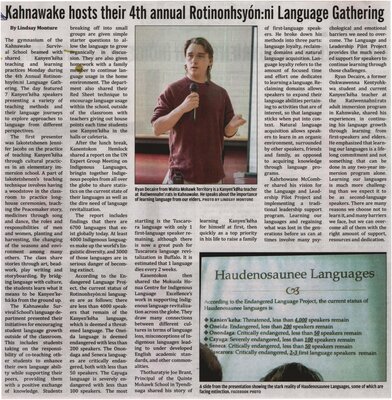"Kahnawake Hosts Their 4th Annual Rotinonhsyon:ni Language Gathering"
- Publication
- Two Row Times (Six Nations of the Grand River, ON), Winter 2016
- Full Text
- Kahnawake hosts their 4th annual Rotinonhsyon:ni Language GatheringBy Lindsay Monture
The gymnasium of the Kahnawake Survival School beamed with shared Kanyen'keha teaching and learning practices Monday during the 4th Annual Rotinonhsyon:ni Language Gathering. The day featured 7 Kanyen'keha speakers presenting a variety of teaching methods and their language journeys to explore approaches to language from different perspectives.The first presenter was Iakotetshenen Jennifer Jacobs on the practice of teaching Kanyen'keha through cultural practices in an elementary immersion school. A part of Iakotetshenen's teaching technique involves having a woodstove in the classroom to practice longhouse ceremonies, teaching the Peacemaker story, medicines through song and dance, the roles and responsibilities of men and women, planting and harvesting, the changing of the seasons and environment among many others. The class share stories through art, beadwork, play writing and storyboarding. By bridging language with culture, the students learn what it means to be Kanyen'keha:ka from the ground up.
The Kahnawake Survival School's language department presented their initiatives for encouraging student language growth outside of the classroom. This includes students taking on the responsibility of co-teaching other students to enhance their own language ability while supporting their peers, providing them with a positive exchange of knowledge. Students breaking off into small groups are given simple starter questions to allow the language to grow organically in discussions. They are also given homework with a family member to continue language usage in the home environment. The department also shared their Red Sheet technique to encourage language usage within the school, outside of the classroom with teachers giving out house points each time students use Kanyen'keha in the halls or cafeteria.
After the lunch break, Kanentokon Hemlock shared a report on the UN Expert Group Meeting on Indigenous Languages, bringin together Indigenous peoples from all over the globe to share statistics on the current state of their languages as well as the dire need of language revitalization.
The report includes findings that thee are 6700 languages that exist globally today. At least 4000 Indigenous languages make up the world's linguistic diversity, and 3000 of those languages are in serious danger of becoming extinct.
According to the Endangered Language Project, the current status of Rotinonhsyon:ni languages are as follows; there are less than 4000 speakers that remain of the Kanyen'keha language, which is deemed a threatened language. The Oneida language is deemed endangered with less than 200 speakers. The Onondaga and Seneca languages are critically endangered, both with less than 50 speakers. The Cayuga language is severely endangered with less than 100 speakers. The most startling is the Tuscarora language with only 1 first-language speaker remaining, although there is now a great push for Tuscarora language revitalization in Buffalo. It is estimated that 1 language dies every 2 weeks.
Kanentokon then shared the Mokuola Honua Centre for Indigenous Language Excellence's work in supporting Indigenous language revitalization across the globe. They draw many connections between different cultures in terms of language loss, misconceptions of Indigenous languages leading to under developed English academic standards, and other commonalities.
Thotharatyie Joe Brant, Principal of the Quinte Mohawk School in Tyendinaga shared his story of learning Kanyen'keha for himself at first, then quickly as a top priority in his life to raise a family of first-language speakers. He broke down his methods into three parts: language loyalty, reclaiming domains and natural language acquisition. Language loyalty refers to the amount of focused time and effort one dedicates to learning a language. Reclaiming domains allows speakers to expand their language abilities pertaining to activities that are of interest, so that language sticks when put into context. Natural language acquisition allows speakers to learn in an organic environment, surrounded by other speakers, friends and family, as opposed to acquiring knowledge through language programs.
Kahrhowane McComber shared his vision for the Language and Leadership Pilot Project and implementing a traditional leadership support program. Learning our languages and regaining what was lost in the generations before us can at times involve many psychological and emotional barriers we need to overcome. The Language and Leadership Pilot Project provides the much needed support for speakers to continue learning through those challenges.
Ryan Decaire, a former Onkwawenna Kentyohkwa student and current Kanyen'keha teacher at the Ratiwennahni:rats adult immersion program in Kahnawake, shared his experiences in continuing his language growth through learning from first-speakers and elders. He emphasized that learning our languages is a life-long commitment and not something that can be done in any two-year immersion program alone. Learning our languages is much more challenging than we expect it to be as second-language speakers. There are many reasons we choose not to learn it, and but we can overcome all of them with the right amount of support, resources and dedication.
- Creator
- Monture, Lindsay, Author
- Media Type
- Newspaper
- Publication
- Item Types
- Articles
- Clippings
- Description
- "The gymnasium of the Kahnawake Survival School beamed with shared Kanyen'keha teaching and learning practices Monday during the 4th Annual Rotinonhsyon:ni Language Gathering. The day featured 7 Kanyen'keha speakers presenting a variety of teaching methods and their language journeys to explore approaches to language from different perspectives."
- Date of Original
- Winter 2016
- Subject(s)
- Personal Name(s)
- Declaire, Ryan ; Jacobs, Jennifer ; Brant, Joe.
- Local identifier
- SNPL004407v00d
- Language of Item
- English
- Creative Commons licence
 [more details]
[more details]- Copyright Statement
- Public domain: Copyright has expired according to Canadian law. No restrictions on use.
- Copyright Date
- 2016
- Copyright Holder
- Two Row Times
- Contact
- Six Nations Public LibraryEmail:info@snpl.ca
Website:
Agency street/mail address:1679 Chiefswood Rd
PO Box 149
Ohsweken, ON N0A 1M0
519-445-2954



